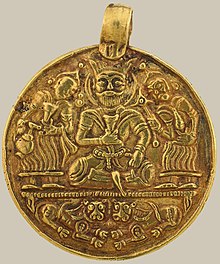'Adud al-Daula
| Adud al-Dawla | |
|---|---|

Medallion of Adud al-Dawla
|
|
| Emir of Fars | |
| Reign | 949–983 |
| Predecessor | Imad al-Dawla |
| Successor | Sharaf al-Dawla |
| Emir of Kerman | |
| Reign | 967–983 |
| Predecessor | Mu'izz al-Dawla |
| Successor | Sharaf al-Dawla |
| Emir of Iraq and Jazira | |
| Reign | 978–983 |
| Predecessor | Izz al-Dawla |
| Successor | Samsam al-Dawla |
| Born | September 24, 936 Isfahan |
| Died | March 26, 983 (aged 53) Baghdad |
| Burial | Najaf |
| Consort | Sayyida bint Siyahgil |
| Father | Rukn al-Dawla |
| Mother | Firuzanid noblewoman |
| Religion | Shia Islam |
Fannā (Panāh) Khusraw (Persian: فنا خسرو), better known by his laqab of ʿAḍud al-Dawla (Arabic: عضد الدولة, "Pillar of the [Abbasid] Dynasty") (September 24, 936 – March 26, 983) was an emir of the Buyid dynasty, ruling from 949 to 983, and at his height power ruling an empire stretching from Makran as far to Yemen and the shores of the Mediterranean Sea. He is widely regarded as the greatest monarch of the dynasty, and by the end of his reign was the most powerful Muslim ruler.
The son of Rukn al-Dawla, Fanna Khusraw was given the title of Adud al-Dawla by the Abbasid caliph in 948 when he was made emir of Fars after the death of his childless uncle Imad al-Dawla, after which Rukn al-Dawla became the senior emir of the Buyids. In 974 Adud al-Dawla was sent by his father to save his cousin Izz al-Dawla from a rebellion. After defeating the rebel forces, he claimed the emirate of Iraq for himself, and forced his cousin to abdicate. His father, however, became angered by this decision and restored Izz al-Dawla. After the death of Adud al-Dawla's father, his cousin rebelled against him, but was defeated. Adud al-Dawla became afterwards the sole ruler of the Buyid dynasty and assumed the Persian title Shahanshah ("King of Kings").
When Adud al-Dawla became emir of Iraq, the capital city, Baghdad, was suffering from violence and instability owing to sectarian conflict. In order to bring peace and stability to the city, he ordered the banning of public demonstrations and polemics. At the same time, he patronized a number of Shia scholars such as al-Mufid, and sponsored the renovation of a number of important Shia shrines.
...
Wikipedia
